The
Mondo Politico Library
The
Full Text of Some of the World's Most Important Political
Books, Online and Free
Here,
in the Mondo Politico Library, you will find a growing collection
of fiction and non-fiction books of a political nature. Mondo
Politico is preparing a broad selection of political classics
for your online enjoyment and will add each one as soon as
it is completed.
At present,
you will find here Mondo Politico's presentation of:

1984
|
"1984"
has long been the first book to which we have turned for
a vivid picture of a government that has used war to justify
infringement on freedom; that has used speech codes to
limit everyone's ability to understand higher concepts
or concepts that favour human individuality; that uses
powerful media to build unwarranted consensus and rewrite
history; and that has used technology to nip political
opposition and individualistic or eccentric practices in
the bud. Far from being a caricature, it insightfully and
skillfully characterizes the tendencies and motivations
of unlimited government power, and the horrifying, hopeless
result of such government: humanity denied its freedom
to think, to be rational, and to dissent...its freedom
to be human.....(Click
Here to
start reading "1984") |

Animal Farm
|
Written
as a "fairy story" (Orwell titled the book "Animal
Farm: A Fairy Story"), the subject of Animal Farm
is very much aimed at an adult audience. Orwell paints
a vivid picture of a violent political revolution of farm
animals against the farmer who owns all, works the animal
population hard, sends their offspring to slaughter, and
feeds them little. Arguably not critical of revolution
itself, Orwell describes an all-to-familiar corruption
that undermines the goal of the revolution: in which those
leading the revolution rally the masses not so much for
the good of the masses, but so that the leaders can assume
the role of master, complete with all of the oppressive
conduct that goes with an authoritarian regime....(Click
Here to
start reading "Animal Farm") |

Common Sense
|
Though
not recognized by some as such, the message in Thomas
Paine's "Common Sense" is timeless. As he says in the
booklet's opening: "The cause of America is in a great
measure the cause of all
mankind. Many circumstances hath, and will arise, which
are not local, but universal, and through which the principles
of all Lovers of Mankind are affected, and in the Event
of which, their Affections are interested. The laying
of a Country desolate with Fire and Sword, declaring
War against the natural rights of all Mankind, and extirpating
the Defenders thereof from the Face of the Earth, is
the Concern of every Man to whom Nature hath given the
Power of feeling; of which Class, regardless of Party
Censures, is the AUTHOR." Click
Here to
read "Common Sense".
|

The Communist Manifesto
|
The
spread of communism was not sparked by the heavy theory
of Karl Marx's "Das Kapital". Rather, it was the simplified
theory and spirited call for action in Marx and Engels'
"Communist Manifesto". Consider the authors' concluding
lines: "The Communists disdain
to conceal their views and aims. They
openly declare
that their ends can be attained only by the forcible overthrow
of all existing social conditions. Let the ruling classes
tremble at a Communistic revolution. The proletarians have
nothing to lose but their chains. They have a world to win. WORKING
MEN OF ALL COUNTRIES, UNITE!" Click
Here to read the "Communist Manifesto". |
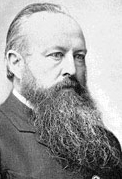
The History of
Freedom
|
What
is the origin of individual freedom and limited government?
Is democracy enough to guarantee
freedom, or is a morality required? What role has Christianity
played in explaining the origins or nature of freedom?
In two speeches
given to the Bridgnorth Institute in 1877, Lord John
Emerich
Edward Dalberg Acton (perhaps best known for his statement
about absolute
power corrupting
absolutely) traces the history of freedom from
the time of the Greeks through to the American Declaration
of Independence. In his first address, "The
History of Freedom in Antiquity",
Lord Acton gives an enlightening review of the experiments
in democracy and republicanism that pre-dated Christianity,
and submits that Jesus' words - rendering unto Caesar
only that which belongs to Caesar - specified a division
of
powers and a blueprint for fending-off absolutist government.
In his second address, "The
History of Freedom in Christianity",
Lord Acton gives an account of the tugs of war between
religion and state that eventually gave rise first, in
Britain, to the Glorious Revolution of 1688, and then,
in America, to the Declaration of Independence. These
two addresses are must-reads for students
of individual freedom.
|
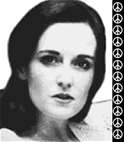
Individualist Anarchism
vs. Communist Anarchism and Libertarianism |
What
is individualist anarchism? What is Communist Anarchism?
What is Libertarianism? How
are they related, and what is the history of each? Should
true Libertarians join a Libertarian
political party, or any political party at all for that matter?
These and other interesting questions are addressed by
Wendy McElroy
in her important 1981 speech, "Individualist Anarchism v.
Communist Anarchism and Libertarianism". Click
Here to
read it. |
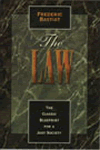
The Law |
What
is law? Where does government get its authority to use
force? What is the scope of the power held by government?
What happens to society when government ignores limits
on the scope of its power, and establishes for itself
the power to violate individual rights of life, liberty
and/or property? Is taxation theft? These are the questions
focussed upon by Bastiat in his famous pamphlet, "The
Law". Click
Here to read "The Law".
|
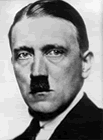
Mein Kampf
|
Adolf
Hitler was instrumental in the formation and growth of
the National Socialist German Workers' Party in Germany
(the NSDAP, or "Nazi" party). He was imprisoned
following his failed "Beerhall Putsch" of November
11, 1923. While in Landsberg prison, he dictated a book
to fellow inmate Rudolf Hess that, in 1925, was released
as "Mein Kampf" (meaning "My Struggle").
In 1933, Hitler came to power in Germany. Under Hitler,
Germany was set on a course of German "nationalism":
a state only for persons who were held to be "Germans".
The quest to extend German jurisdiction, and "Germanism",
over much if not all of continental Europe eventually led
to the second world war. No person who speaks with any
authority about Adolf Hitler, Naziism, or the holocaust
has neglected to read Hitler's "Mein Kampf",
which provides both Hitler's history of the NSDAP and a de
facto warning about the sorts of changes that were
to be made in Germany under the government of Adolf Hitler. Click
Here to read an English translation of Mein Kampf. |
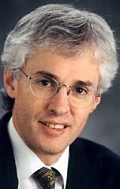
The Myth of the Federal Spending Power
|
Andrew
Petter's article, "Federalism
and the Myth of the Federal Spending Power", is an
in-depth examination of how, in a federal state, a federal
government can free itself from constitutional limitations
on its jurisdiction. Although Petter is discussing the
situation in Canada in particular, his insights transcend
Canadian politics by demonstrating a federal government's
willingness to disregard constitutional limits on its jurisdiction,
a provincial/state government's willingness to allow a
violation of its legal rights in exchange for federal cash
infusions, an academic community's (often politically-motivated)
tendency to justify a government's disregard for jurisdictional
limits, and a people's complete lack of any detailed awareness
of the existence or importance of limits on legislative
power in a federal state. Click
Here to read "Federalism and the Myth of the Federal
Spending Power". |

The Social
Contract |
What
gives a government a right to make laws and use physical
force against the governed? Are the rights of individuals
compatible with government? If so, how? And what, exactly,
is the nature of the "social contract" that politicians,
even in our time, continue to make reference to? Some particularly
famous answers to these and related questions were provided
by Jean-Jacques Rousseau in his book, "The Social Contract". Click
Here to
read the G.D.H. Cole English translation. |
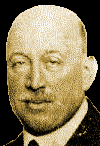
Social Credit
|
In
his book "Social Credit", Major Clifford Hugh Douglas argued that
increases in productivity - resulting as they do from innovation
and technological advancement over
time - are a "cultural heritage" that belongs
not to banks but to all members of society. His message
was clear: under the current system of banking, the citizenry
are prevented from benefitting from their own cultural
heritage,
and
this
leaves them
increasingly indebted to banks, and unable to reduce, over
time, the portion of their lives that they spend working
and simply trying to survive. Under social credit, Douglas
foresaw a decrease in work and an increase in leisure
or, at least, the opportunity to work less if one were so to
choose. Politically, Social Credit was - and remains -
most influential in Canada, though the social credit movement,
even today, can be found in much of the commonwealth. Click
Here to read "Social Credit". |
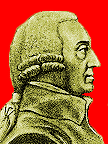
The Wealth of Nations |
Drawing
on examples from around the world, Adam Smith's book "An
Inquiry into the Nature and Causes of the Wealth of Nations" demonstrated
that free markets and competition actually reduce poverty
and generally improve the standard of living. The Wealth
of Nations provided the intellectual underpinnings for
the following century of free trade and economic expansion....(Click
Here to
start reading "The Wealth of Nations")
|

What is Property? |
Is
Property actually...theft? So stated Pierre Joseph
Proudhon in his two Memoirs on the subject of property
and government entitled "What is Property?: An
Inquiry into the Principle of Right and of Government".
Written in 1840 and 1841, this work was particularly important
in the development both of anarchism and communism. Proudhon
was arguably the first person to label himself an "anarchist".
Click
Here to
start reading "What is Property?". This version was
translated from the original french by individualist anarchist
Benjamin Tucker in 1890. It includes a section entitled "Front
Matter"
that gives a detailed account of Pierre Proudhon's life and
work. |
In the
weeks and months to come, we will be adding such classic (and
often controversial) titles as:
- Republic (Plato)
- Leviathan (Hobbes)
- Locke's Second
Treatise of Government
- On
Liberty (Mill)
- Rights
of Man (Paine)
- Das
Kapital (Marx)
- Anthem (Rand)
and much,
much more. So bookmark Mondo Politico, and keep coming back
to see what we've added to the bookshelf.
|